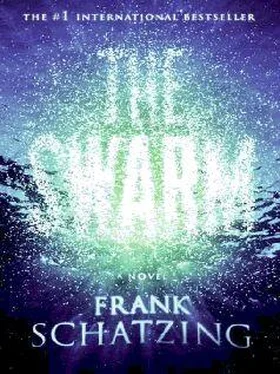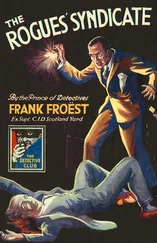'And what would the signal be telling the workers in the morning?
'Get up and go to the building-site.'
'Anything else?'
'Remember where you belong when you get there.'
'Exactly. But these guys are labourers, so they don't indulge in fancy conversation. They're hard-working men. They sweat in bed, they sweat when they get up in the morning- they're sweating all day long. How do they recognise each other?'
Weaver pulled a face. 'By their smell?'
'Bingo!'
'I'm beginning to worry about your imagination.'
Anawak laughed. 'It's Oliviera's fault. She was talking about those bacteria earlier, the ones that form aggregates, Myxococcus xanthus . Remember? They secrete a scent and group together.'
Weaver nodded. It made sense. I'll think it over while I'm swimming,' she said. 'Want to come?'
'Swimming? Now?'
'Yes, now,' she teased him. 'Listen, under normal circumstances I wouldn't spend the whole day cooped up in a room without moving.'
'I thought that was normal for computer geeks.'
'Are you saying I'm pale and flabby?'
'I've never seen anyone paler or flabbier.' He grinned.
She saw the sparkle in his eyes. He was small and compact, not exactly George Clooney, but right now he seemed tall, self-assured and good-looking. 'Idiot,' she said.
'Thanks.'
'Just because you spend half your life under water, you think anyone who works with computers must be chained to their desk. For your information, I do most of my work outdoors. I spend most of my time thinking . I grab my laptop and take off. There's no reason why you shouldn't write features from a cliff-top. Sitting here makes me tense up. I'm going to get shoulders like steel girders.'
Anawak stood up. For a moment Weaver thought he was leaving. Then she felt his hands on her back. His fingers stroked the muscles in her neck, while his thumbs kneaded her shoulders.
He was massaging her back.
Weaver stiffened.
She liked it. But did she want it?
'You're not tense,' said Anawak.
He was right. Why had she said it?
She stood up abruptly and his hands dropped away. She knew she'd made a mistake. She wanted to sit down again and let him carry on. But it was too late.
'Well, I guess I'll be going then,' she said awkwardly.
ANAWAK
He wondered what had gone wrong. He would have liked to join her in the pool, but the mood had changed. He should have asked before he massaged her shoulders. Maybe he'd misread the situation. You're no good at this kind of thing, he told himself Stick to your whales, you stupid Eskimo.
He thought about going in search of Johanson and continuing their discussion about single-cell intelligence, but somehow he didn't feel like it. He decided to stop by the CIC instead. Greywolf and Delaware spent much of their time there, monitoring and evaluating audio and video output from the fleet. But there was nothing to see except images of murky water from the cameras on the hull. Things had been quiet since the whales had circled the boat that morning, and now they seemed to have gone. Shankar was sitting on his own wearing a pair of oversized headphones, listening to the depths, while a constant stream of numbers passed before him on the screen. According to one of the crew, Greywolf and Delaware were busy on the well deck, substituting MK6 for MK7.
Anawak marched down the vehicle ramp and on to the empty hangar deck. It was cold and draughty. He'd been meaning to carry straight on, but something held him back. Although daylight was visible through the gate-like openings where the deck elevators were situated, the bay was dominated by the pale, yellowish glow of the sodium vapour lamps. He tried to imagine what it would look like when it was full of helicopters, Harrier jets, vehicles, cargo and equipment, all packed in with just enough room to open a door, climb through a window or slip into a hatch. Jeeps and forklift trucks would rattle up and down the ramps, and once the aircraft were on the roof, hundreds of marines would sort weaponry and equipment swiftly and intently. The formidable apparatus of the Independence would pull together as one.
The vast expanse of the bay seemed absurd in its emptiness. Useless. The booths between the ribs were unmanned. High among the steel girders on the gloomy ceiling, the yellow lamps had nothing to illuminate. Pipes ran along the walls, ending in the void. There were hazard signs everywhere, but no one to see them.
'If things get too cosy in the gym, we sometimes shift a few of the treadmills down here,' Peak had said, as he'd shown them round the vessel in Norfolk. 'Then it's real homey.' He'd stood there frowning. 'It's too empty. I hate to see the hangar like this. There are times when I hate this whole damn mission.'
The emptiest room, Anawak thought, is always on the inside.
He crossed the bay unhurriedly and walked out on to the portside elevator. The platform towered above the waves like a vast balcony. It was held in place by vertical slide rails that ran up the side of the ship. Anawak peered out across the water. The wind buffeted him. A strong gust could easily have swept him off his feet and over the edge of the platform. There weren't any rails, but safety nets encircled the ship so that no one could be pitched into the sea by the wind or aircraft exhaust.
It was still risky, though.
Ten metres below him, the waves rose up from the ocean.
The light was weak, but the icy rain had stopped. The sea rose and fell, slate-grey, with veins of white. A watery desert. For more than half of his life he'd lived in the temperate climate of the Canadian west coast, and now, for the second time in a few months, Fate had sent him back to the ice.
The wind tugged at his hair. Gradually he could feel his skin becoming numb with cold. He cupped his hands in front of his mouth, and puffed warm air inside them.
Then he went back into the bay.
LAB
Johanson had promised to treat Oliviera to some real lobster when the crisis was over. He used the Spherobot to fish out a crab from the chamber, then bring it back to the garage, where hermetically scalable PVC-coated containers were ready and waiting. The robot dropped the crab into one of the boxes and closed the lid.
The container was moved through a sluice gate and into a dry area, where it was sprayed with peracetic acid, rinsed, blasted with sodium hydroxide and conveyed out of the chamber through a second sluice. Now it didn't matter how toxic the water was inside the deep-sea chamber: the outside of the container was clean.
'Are you sure you can manage on your own?' asked Johanson. He'd already scheduled a phone conversation with Bohrmann, who was about to lower the suction tube in La Palma.
'No problem.' Oliviera picked up the box that contained the crab. 'If anything goes wrong, I'll scream. Hopefully you'll hear me and not that jerk Rubin.'
Johanson chuckled. 'Do I detect a shared antipathy?'
'Oh, I've got nothing against the guy,' said Oliviera. 'If only he wasn't so hung up on winning a Nobel Prize.'
'I know what you mean. How about you, though? Aren't you interested in a bit of glory? We'll all be vaguely famous, if we get out of this alive.'
'Oh, I wouldn't say no to a few groupies. Life in the lab can be desperately dull.' Oliviera stopped short. 'Which reminds me, where is he anyway?'
'Rubin?'
'He was determined to be around for the DNA tests.'
'You should be grateful.'
'Oh, I am. But I'd still like to know what he's up to.'
'It's bound to be something constructive,' Johanson said soothingly. 'I mean, he's not a bad guy. He doesn't smell, he's not an axe-murderer, and he's got a whole stack of medals in his drawer. We don't have to like him as long as he's useful.'
Читать дальше












